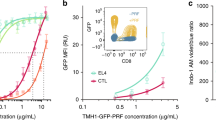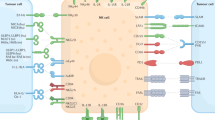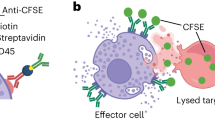Abstract
MUCH interest has focused recently on the elucidation of cytotoxic mechanisms in cellular immunology. In addition to complement-mediated cytolysis, two major cell-mediated reactions have been realised from in vitro studies: the cytotoxic T-cell1,2 and K-cell3,4 systems. The former is characterised by the killing of target cells by cytotoxic T cells taken from donors previously sensitised to target cells, whereas in the latter, target cells are destroyed by normal or unsensitised effectors (K cells), provided IgG antibody to the target cell is present. The exact nature of the K cell is still a matter of controversy5,6. Although a voluminous literature exists, little is known about the actual mechanism(s) of action of cytotoxic lymphoid cells. We describe here experiments which implicate phospholipase A activity as an early step of the kill mechanism in K-cell cytotoxicity.
This is a preview of subscription content, access via your institution
Access options
Subscribe to this journal
Receive 51 print issues and online access
$199.00 per year
only $3.90 per issue
Buy this article
- Purchase on Springer Link
- Instant access to full article PDF
Prices may be subject to local taxes which are calculated during checkout
Similar content being viewed by others
References
Miller, J. F. A. P., Brunner, K. T., Sprent, J., Russell, P. J., and Mitchell, G. F., Transplant. Proc., 3, 915–917 (1971).
Cerottini, J. C., Nordin, A. A., and Brunner, K. T., J. exp. Med., 134, 553–564 (1971).
Moller, E., Science, 147, 873–879 (1965).
MacLennan, I. C. M., Connell, G. E., and Gotch, F. M., Immunology, 26, 303–310 (1974).
Cerottini, J. C., and Brunner, K. T., Adv. Immun., 18, 67–132 (1974).
Greenberg, A. H., Shen, L., and Roitt, I. M., Transplant. Allergy, 1, 33–35 (1973).
Perlmann, P., and Perlmann, H., Cell. Immun., 1, 300–315 (1970).
Rosenthal, A. F., and Geyer, R. P., J. biol. Chem., 235, 2202–2206 (1960).
Klibansky, C., and DeVries, A., Biochim. biophys. Acta, 70, 176–187 (1963).
Scornik, J. C., J. Immun., 113, 1519–1526 (1974).
Gatt, S., and Barenholz, Y., A. Rev. Biochem., 42, 61–90 (1973).
Turner, J. D., and Rouser, G., Lipids, 9, 49–54 (1974).
Lankisch, P. G., and Vogt, W., Biochim. biophys. Acta, 270, 241–247 (1972).
Roelofsen, B., Zwaal, R. F. A., Comfurius, P., Woodward, C. B., and van Deenen, L. L. M., Biochim. biophys. Acta, 241, 925–929 (1971).
Condrea, E., deVries, A., and Mager, J., Biochim. biophys. Acta, 84, 60–73 (1964).
Author information
Authors and Affiliations
Rights and permissions
About this article
Cite this article
FRYE, L., FRIOU, G. Inhibition of mammalian cytotoxic cells by phosphatidylcholine and its analogue. Nature 258, 333–335 (1975). https://doi.org/10.1038/258333a0
Received:
Accepted:
Issue Date:
DOI: https://doi.org/10.1038/258333a0
This article is cited by
-
Apoptosis-inducing factor of a cytotoxic T cell line: involvement of a secretory phospholipase A2
Cell and Tissue Research (2006)
-
Influence of acute-phase proteins on the activity of natural killer cells
Inflammation (1985)
Comments
By submitting a comment you agree to abide by our Terms and Community Guidelines. If you find something abusive or that does not comply with our terms or guidelines please flag it as inappropriate.



